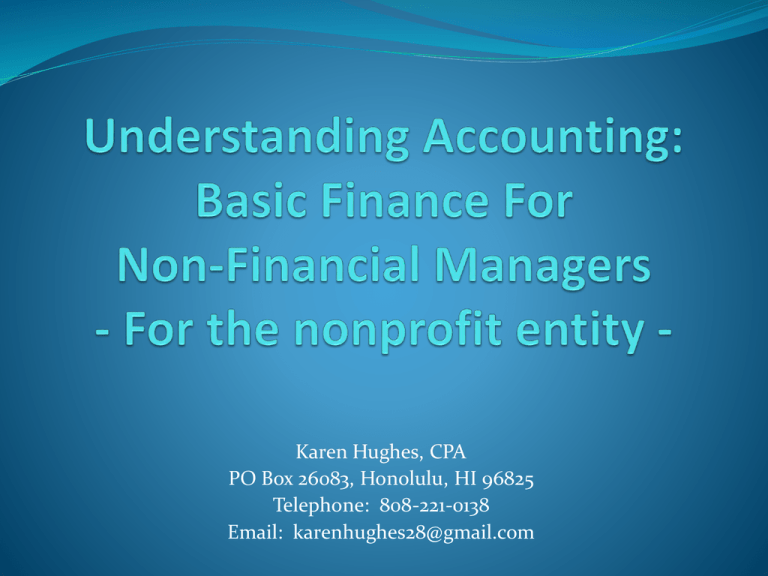Nonprofit Taxation & Accounting
advertisement

Karen Hughes, CPA PO Box 26083, Honolulu, HI 96825 Telephone: 808-221-0138 Email: karenhughes28@gmail.com You formed an entity….now what? Sole Proprietorship Limited Liability Company (LLC) * Single-member LLCs * Multiple-member LLCs Partnership Corporation S-Corporation Nonprofit Organization We’ll focus on the nonprofit organization today… Nonprofit Organizations Today we’ll cover the basics: Tax exemption application Federal taxation State taxation Department of Attorney General requirements Hawaii General Excise Tax Federal Tax Exempt Application Most commonly the 501(c)3 application Who can file? Must be organized as a trust, corporation, or an association Organizations organized and operated exclusively for religious, charitable, scientific, testing for public safety, literary, or educational purposes, or to foster national or international amateur sports competition, or for the prevention of cruelty to children or animals Federal Tax Exempt Application You may not have to file if annual gross receipts normally under $5,000; churches also do not need to file You may be tax exempt under above circumstances but you must file the application and receive exemption recognition from the IRS for the donations made to your organization to be tax deductible Federal Tax Exempt Application File within 27 months from date of entity formation for tax exempt status to apply retroactively to date of formation If you don’t file within 27 months of formation, you may not be able to qualify for exempt status before IRS receives application, generally the postmark date is used Federal Tax Exempt Application Application will be available for public inspection, so carefully and correctly complete your application A charitable organization must make available to the public their approved exempt application, all supporting documents, last 3 annual information returns upon request without charge (reasonable fee for reproduction and copying costs are ok). The IRS imposes penalties for failure to comply with these requirements Federal Tax Exempt Application How do you file and how much does it cost? Generally on Form 1023 for 501(c)3 organizations, available at www.irs.gov Cost to file: $400 those with annual gross receipts less than $10,000 during preceding 4 years; $850 for those with annual gross receipts more than $10,000 Be sure to review application carefully before you submit! Call IRS if you do not hear from them within 180 days Federal Tax Exempt Application In 2014 the IRS created Form 1023-EZ and you can apply online. There’s a 7-page eligibility worksheet to determine if you can use Form 1023-EZ instead. You must answer “No” to all the questions to qualify to file Form 1023-EZ. Look under Form 1023-EZ instructions Fee is $400 Much shorter and simplified application. If approved, as quickly as 3 to 4 weeks. Call IRS if you do not hear from them within 90 days http://www.stayexempt.irs.gov/ Federal Tax Requirements What do you need to file annually with the IRS? Generally file one of the 990-series forms Status Form to File Gross receipts normally < $50,000 990-N (e-Postcard) Gross receipts < $200,000, and Total Assets < $500,000 990-EZ or 990 Gross receipts > $200,000, or Total assets > $500,000 990 Private foundations – regardless of financial status 990-PF Federal Tax Requirements File Form 990-N E-Postcard at http://epostcard.form990.org/ Other 990 Forms can be found on www.irs.gov Due dates for filings: Generally on the 15th day of the 5th month after year ends Example: nonprofit organization with year end 12/31/2014 – filing will be due 5/15/2015 Nonprofit organization with fiscal year end 7/31/2015 – filing will be due 12/15/2015. May apply for two – 3 month extensions Federal Tax Requirements Be sure to file your annual tax or informational returns. If you do not file for 3 consecutive years, you will automatically lose your tax exempt status. There is a list on IRS website of organizations whose tax-exempt status was automatically revoked because of failure to file. There are about 3100 organizations in State of Hawaii whose tax exempt status was revoked due to noncompliance If you do not have tax-exempt status, you must file a return based on your entity type Federal Tax Requirements IRS penalties for nonfiling of Form 990 are high: $20/day, about $600/month, not to exceed lesser of $10,000 or 5% of the organization’s gross receipts for that year, unless you can show late filing was due to reasonable cause Organizations whose gross receipts exceed $1 million are subject to penalty of $100/day, about $3,000/month, with maximum penalty for any one return of $500,000 Penalties against responsible person(s) may also be imposed if the IRS notifies organization to file if the organization continues to remain noncompliant. The penalty is $10/day with maximum penalty on all persons for failure to file any one return not to exceed $5,000 Hawaii State Tax Requirements In general, if you have a federal tax exempt status, you do not need to file a Hawaii state tax exempt/nonprofit organization tax return Unless, you have Hawaii gross income from an unrelated trade or business activity of $1,000 or more. File Hawaii Form N-70NP. Forms and instructions are available online at www.tax.Hawaii.gov/forms Dept of Attorney General Requirements The State of Hawaii Department of Attorney General’s Tax & Charities Division administers and enforces Hawaii’s charitable solicitation law and provides oversight of Hawaii’s public charities, charitable trusts, and private foundations. Visit their website at www.ag.Hawaii.gov/tax Dept of Attorney General Requirements If your organization solicits contributions, you must register unless you are exempt: Churches and other religious organizations Parent-teacher association Organization normally receives less than $25,000 in contributions annually, if organization does not compensate any professional solicitor or professional fundraising counsel Other less common organizations Dept of Attorney General Requirements Register your organization if necessary (no cost): http://efile.form990.org/frmNPRequestLogin.asp File annual financial report “Hawaii Charity Annual Transmittal Form” and attach PDF copy of the filed IRS Form 990 or 990EZ or prepare on their website If you file federal Form 990-N (E-Postcard), file “Annual Charity Transmittal Form” with AG File annual reports here: http://efile.form990.org and click on “Hawaii” under Quick Menu Dept of Attorney General Requirements If you file Form 990 or 990EZ, the annual report due to AG is the due date of the Form 990/990EZ including extensions If you file Form 990-N, the annual report due to AG is no later than the 15th day of the 5th month following close of organization’s fiscal year Organizations who receive more than $500,000 in gross revenues or have an audited financial statement because it was required to obtain one by another governmental agency or 3rd party, must also submit a copy of the audited financial statement Dept of Attorney General Requirements Filing fees are based on organization’s gross revenues: Gross Revenues Annual Fee Less than $25,000 $10 $25,000 but less than $50,000 $25 $50,000 but less than $100,000 $50 $100,000 but less than $250,000 $100 $250,000 but less than $500,000 $150 $500,000 but less than $1 million $200 $1 million but less than $2 million $250 $2 million but less than $5 million $350 $5 million and over $600 Dept of Attorney General Requirements Late Fees: $20/day up to maximum of $1,000 for late filing $20/day up to maximum of $1,000 for late payment You cannot register with AG until you receive your tax exempt status. Hawaii General Excise Tax Every person doing business during the year in the State of Hawaii must obtain a license and file returns Tax is on gross income, before expenses, with some exceptions Oahu: Also has county surcharge tax of 0.5% because of rail transit project Common Tax Rates: Oahu 4.5% All other islands 4.0% Hawaii General Excise Tax Even if you are a nonprofit organization, you must file your general excise tax returns Revenues related to your organization mission is tax exempt if you have a GE tax exemption (still file a “zero” return) Fundraising revenues and other “unrelated business income” are subject to GE tax. Fundraising income is subject to the 4% tax rate. Hawaii General Excise Tax To obtain a GE tax license: Use Hawaii Business Express to obtain a GE tax license: https://hbe.ehawaii.gov/BizEx/home.eb Or file Form BB-1 or BB-1X Register to file and pay GE tax returns online: http://tax.hawaii.gov/eservices/ Or file on paper Forms G-45 (don’t forget annual Form G-49) Forms are available at www.tax.Hawaii.gov/forms Hawaii General Excise Tax How often do I need to file? Semi-Annually: if you will pay $2,000 or less in GE taxes per year (at 4.5% Oahu rate, about $44,500 or less of gross revenues for the year) Quarterly: if you will pay $4,000 or less in GE taxes per year (at 4.5% Oahu rate, about $89,000 or less of gross revenues for the year) Monthly: if you will pay more than $4,000 in GE taxes per year (at 4.5% Oahu rate, gross revenues over about $89,000 for the year) Hawaii General Excise Tax When are the filing due dates? Semi-annually January – June period due July 20th July – December period due January 20th Quarterly January – March due April 20th April – June due July 20th July – September due October 20th October – December due January 20th Monthly Due 20th of each month (Ex: January is due February 20th) How do we file for GE tax exemption? File paper Form G-6 or G-6S: Application For Exemption From General Excise Taxes ($20 fee) Use Form G6-S (short form) if you are applying within 3 years from date of organization received or applied for a federal income tax exemption All others use Form G-6 If you are a Hawaii organization and file within 3 months from date your were legally formed, then your approved application will be effective on date of legal entity formation. If didn’t file within 3 months, may request for retroactive approval Hawaii General Excise Tax Why do we charge 4.712%? Because we pay tax on entire amount we collect from our customers Example of sales to customer: Sales $10,000 Oahu GE Tax 4.712% = $471.20 Total sales: $10,471.20 Tax paid to Hawaii State Tax Collector: $10,471.20 x 4.5% = $471.20 If we only charged 4.5% to our customers…….. Sales $10,000 x 4.5% = $450 Total sales: $10,450 Tax paid to Hawaii State Tax Collector: $10,450 x 4.5% = $470.25 $470.25 - $450.00 = $20.25 which we have to pay out of pocket






